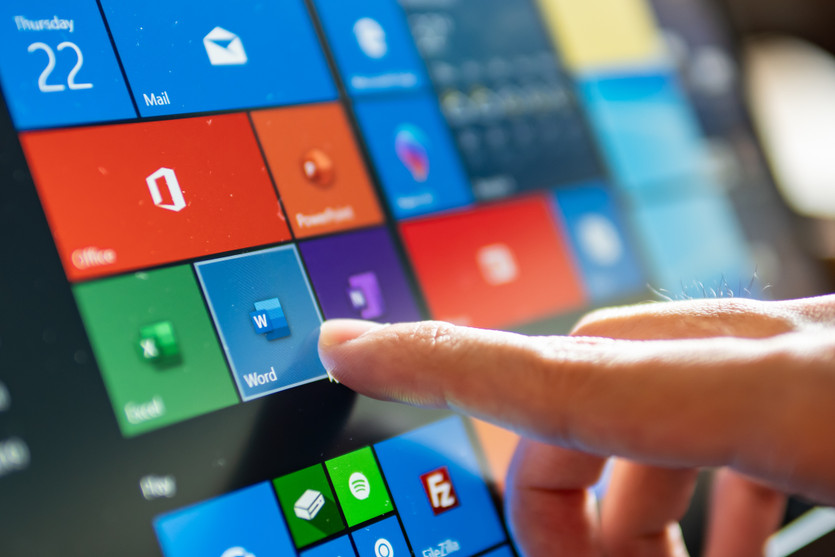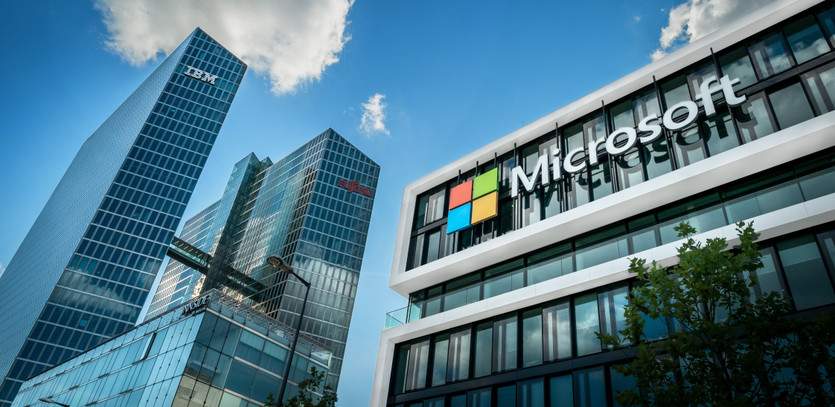The Giant Tech: Microsoft Corporation
Microsoft Corporation (MSFT) is not only one of the world's leading tech companies but also a powerful global brand. Pioneers in personal computing, the company has never rested on its laurels, persistently reinventing itself to keep pace with the dynamic tech landscape.
-
Legacy of Innovation: The company was established in 1975, following the vision of two budding tech enthusiasts, Bill Gates and Paul Allen. They initially developed software for Altair 8800, one of the earliest personal computers. The defining moment came five years later when the duo was approached by IBM to provide an operating system for its maiden personal computer (PC). This led to the groundbreaking launch of Microsoft's legendary Windows software product in 1985.
-
Financial Milestone: In 1986, Microsoft floated its stocks on the market through an initial public offering (IPO), raising a staggering $61 million, which experts heralded as "the deal of the year." By the late 80s, Microsoft had successfully positioned itself as the world’s top PC software company.
-
Leadership and Market Dominance: Microsoft's headquarters are nestled in Redmond, Washington, and the company is helmed by CEO Satya Nadella, who took the reins in 2014. As a juggernaut in the information technology sector, Microsoft's operations span a vast spectrum of the software industry. Today, it competes fiercely with giants such as Apple Inc. (AAPL), Amazon.com Inc. (AMZN), International Business Machines Corp. (IBM), and Oracle Corp. (ORCL).
-
Impressive Performance: The financial year (FY) 2021, which ended on June 30, 2021, saw Microsoft reporting an impressive net income of $61.3 billion on a whopping $168.1 billion in revenue. As of Oct. 13, 2021, the company's market capitalization was at a jaw-dropping $2.2 trillion, making it one of the largest companies globally.
-
Innovation at the Core: At its heart, Microsoft continues to be a trailblazer, known for its wide array of products and services, including business solution applications, productivity applications, and video games. Additionally, Microsoft is continuously expanding its focus into futuristic areas such as artificial intelligence, the Internet of Things (IoT), mixed reality, and other cutting-edge technologies.
Key Points:
- Microsoft is a leading global tech company, famous for its personal computing devices, cloud systems and services, and software.
- The company faces stiff competition from top players like Apple Inc., Amazon.com Inc., International Business Machines Corp., and Oracle Corp.
- For FY 2021, Microsoft reported a net income of $61.3 billion on a total revenue of $168.1 billion.
- The company is focused on increasing its presence in next-gen tech domains like artificial intelligence, IoT, mixed reality, and more.
On Oct. 13, 2021, Bloomberg broke the news of Microsoft agreeing to commission an independent human rights review of its contracts with government entities and law enforcement agencies. This crucial step followed the increasing scrutiny from shareholders and employees concerning the company's contracts with various government bodies, the military, and police agencies.
The Birth and Growth of Microsoft
Microsoft, a name synonymous with personal computing, originated from the tech-savvy minds of Bill Gates and Paul Allen back in 1975. Its mission: to create software for the Altair 8800, one of the first personal computers.
-
Founding and Early Development: Gates and Allen's humble beginning in developing software for an early personal computer was just a prelude to the ambitious strides they would make in the tech industry. The real game-changer occurred five years later when IBM, a burgeoning tech titan of that era, enlisted their expertise to create an operating system for its debut personal computer (PC).
-
Rise to Prominence: The year 1985 marked a historic milestone for Microsoft with the launch of the now-iconic Windows software product. It quickly became ubiquitous, changing the face of computing for millions of people worldwide.
-
Financial Triumph: On March 13, 1986, the tech prodigy, still in its early stages, made its initial public offering (IPO). Raising a commendable $61 million, Microsoft's IPO was termed as "the deal of the year." By the end of the 1980s, Microsoft had emerged as the world’s largest PC software company, a testament to its technological prowess and strategic vision.
Bold Key Insights:
- Microsoft was founded by Bill Gates and Paul Allen in 1975 to develop software for one of the first personal computers, the Altair 8800.
- Microsoft's breakthrough came with the development of the operating system for IBM's debut PC, leading to the launch of the legendary Windows software.
- The company's initial public offering (IPO) in 1986 raised $61 million, catapulting it to the position of the world's largest PC software company by the late 80s.
Today, Microsoft's headquarters is in Redmond, Washington. Under the astute leadership of CEO Satya Nadella since 2014, the company continues to innovate and grow in the realm of information technology, transcending its initial association with the software industry.
Microsoft's primary competitors are other tech powerhouses such as Apple Inc. (AAPL), Amazon.com Inc. (AMZN), International Business Machines Corp. (IBM), and Oracle Corp. (ORCL). Even amidst this fierce competition, Microsoft has held its ground, reporting an impressive net income of $61.3 billion on $168.1 billion in revenue for FY 2021, ended June 30, 2021.
With a stunning market capitalization of $2.2 trillion as of Oct. 13, 2021, Microsoft firmly stands as one of the most valuable companies in the world.
Leadership and Business Strategy
Since its inception, Microsoft has remained a dominant force in the tech industry, thanks to its visionary leadership and strategic business acumen. Currently headquartered in Redmond, Washington, the tech giant has been under the expert stewardship of Chief Executive Officer (CEO) Satya Nadella since 2014.
-
Dynamic Leadership: Satya Nadella, who has been leading Microsoft since 2014, is recognized for his exceptional leadership skills. Under his guidance, Microsoft has ventured into new horizons, reaching unparalleled heights in the tech industry.
-
Innovative Business Strategy: While initially associated primarily with the software industry, Microsoft has successfully diversified its product portfolio to include personal computing devices, cloud systems and services, productivity applications, and even video games.
-
Pioneering in Cutting-Edge Technology: Always ahead of the curve, Microsoft is now expanding its focus towards emerging technologies, such as artificial intelligence, the Internet of Things (IoT), mixed reality, and other related innovations.
Bold Key Insights:
- Microsoft is currently led by CEO Satya Nadella, under whose leadership the company has ventured into new technological domains and reached new heights.
- Though initially associated primarily with software, Microsoft has diversified its offerings, extending into personal computing devices, cloud systems and services, and more.
- The tech giant is also making significant strides in emerging technologies like artificial intelligence, Internet of Things (IoT), and mixed reality.
It's worth noting that Microsoft is not just a consumer-focused company; it offers business solution applications, appealing to a wide range of industries. Microsoft's impressive product and service range places it in direct competition with several other tech giants, including Apple Inc. (AAPL), Amazon.com Inc. (AMZN), International Business Machines Corp. (IBM), and Oracle Corp. (ORCL).
For FY 2021, which ended June 30, 2021, Microsoft reported a staggering $61.3 billion in net income on $168.1 billion in revenue, a testament to its successful business strategy. As of Oct. 13, 2021, the company's market capitalization stood at $2.2 trillion, cementing its position as one of the largest companies globally.
Recent Updates from Microsoft
The dynamic world of technology is ever-changing, and Microsoft is often at the forefront of these developments. Let's delve into some of the company's recent notable updates:
-
Human Rights Review Commitment: On October 13, 2021, Microsoft pledged to an independent human rights review of its contracts with governments and law enforcement agencies. This step was taken in response to mounting pressure from shareholders and employees, concerned about the company's contracts with these entities. The focus of the review is on how Microsoft's products impact Black, Indigenous, and People of Color communities in contracts involving police, immigration enforcement, and other government agencies.
-
Cybersecurity Wins: Just two days prior, on October 11, 2021, Microsoft’s cloud services division, Azure, announced its successful defense against a massive Distributed Denial-of-Service (DDoS) attack. As one of the largest DDoS attacks to date, the defense was a notable cybersecurity victory for Microsoft, highlighting their commitment to customer protection.
-
Product Launch: On September 22, 2021, Microsoft announced the introduction of eight fresh products for its Surface device line. The new lineup included improved versions of previously launched smartphones and laptops, along with the Surface Laptop Studio, a blend of tablet and laptop.
Bold Key Insights:
- Microsoft is committed to maintaining a responsible corporate image, illustrated by its commitment to an independent human rights review of its contracts.
- The company's prowess in cybersecurity is demonstrated by its successful defense against a significant DDoS attack.
- Microsoft continues to innovate its product lineup, as demonstrated by the recent launch of eight new products for the Surface device line.
With constant innovation and an unwavering commitment to responsible business practices, Microsoft continues to be a leader in the tech world.

Key Events: JEDI Contract and Windows 11
In the fast-paced world of technology, Microsoft continues to make headlines with pivotal events and releases. Here are some of the noteworthy instances:
-
The JEDI Contract: This started when Microsoft was awarded a whopping $10 billion cloud computing contract for the Joint Enterprise Defense Infrastructure (JEDI) by the U.S. Department of Defense in 2019. However, controversy brewed as critics, including Amazon.com Inc., alleged political influence in the decision-making process, leading to several legal challenges. In a surprising twist, the Pentagon canceled the contract on July 6, 2021, expressing interest in pursuing a deal with both Microsoft and Amazon, along with potential additional cloud service providers.
-
Launch of Windows 11: On August 31, 2021, Microsoft announced the release of Windows 11, the latest iteration of its popular operating system and its first major upgrade in years. Available as a free upgrade for eligible Windows 10 PCs from October 5, 2021, the system boasts enhanced speed, a new design, added accessibility features, efficient input settings, a focus on hybrid work, and more. Windows 11 indicates a significant shift in Microsoft's approach, as the company had previously maintained a policy of simply updating its existing operating system.
Bold Key Insights:
- The JEDI Contract saga and its eventual cancellation showed Microsoft's significant potential in the realm of cloud computing, even amidst the controversy.
- The launch of Windows 11 reflects Microsoft's ongoing commitment to innovation and enhancing user experience in the ever-evolving digital landscape.
These significant events further highlight Microsoft's active involvement and constant evolution in the technology sector.
Hafnium Cyberattacks on Microsoft Exchange Server
In the digital world, cybersecurity threats are a constant concern. Microsoft found itself in the eye of a cybersecurity storm in early 2021:
The Hafnium Incident: On March 2, 2021, Microsoft revealed that it was the target of a state-sponsored cybersecurity threat from a group it named "Hafnium," based out of China. This assault targeted Microsoft Exchange Server, a widely used product offering email and calendar services to countless customers.
Microsoft responded to the attack by releasing a series of patches for Microsoft Exchange Server. However, the solution was not without its own issues. If users did not install the patch correctly, it failed to fully update the necessary files. What's more concerning is that no warning was provided to the user about the unsuccessful patch installation.
The extent of the Hafnium attacks was alarming, with industry experts describing the event as "astronomical" and "crazy huge". It was reported that there were “at least 60,000 known victims globally.”
In a significant development in July 2021, the U.S. government, along with Western allies, formally accused China of the attack. However, this was not accompanied by sanctions against the Chinese government. The U.S. Justice Department did bring charges against four Chinese nationals who were allegedly working with China's Ministry of State Security on the cyberattack.
Bold Key Insights:
- The Hafnium incident underscores the constant threat of cyberattacks that tech companies like Microsoft face, highlighting the critical need for strong cybersecurity measures.
- Despite the proactive response by Microsoft, the Hafnium attack serves as a stark reminder of the challenges that exist in maintaining the security of widely used digital platforms.
The Hafnium incident was a serious cybersecurity event that demonstrated the vulnerabilities that even tech giants like Microsoft can face, and the measures they need to take to protect their customers.
Microsoft's Dividends and Stocks: A Snapshot
The dynamics of Microsoft's dividends and stocks present an engaging panorama of the tech giant's financial health and investor relations. Here's an intricate look at the key aspects:
Dividend Distribution: Microsoft has consistently rewarded its shareholders with dividends, reflecting the company's strong financial performance. As of December 9, 2021, the tech behemoth has declared a quarterly dividend of $0.62 per share. This financial decision enhances the trust and loyalty of investors towards the company.
Stock Splits: Microsoft's journey has seen its stock undergo nine splits in total, signifying the company's growth and the consequent adjustment in its share price. The splits include:
- September 18, 1987: 2-for-1 split
- April 12, 1990: 2-for-1 split
- June 26, 1991: 3-for-2 split
- June 12, 1992: 3-for-2 split
- May 20, 1994: 2-for-1 split
- December 6, 1996: 2-for-1 split
- February 20, 1998: 2-for-1 split
- March 26, 1999: 2-for-1 split
- February 14, 2003: 2-for-1 split
Each of these stock splits indicates a pivotal moment in Microsoft's financial evolution and has potential implications for shareholders.
Stock Circulation: As of July 26, 2021, Microsoft had 7,514,891,248 shares outstanding, a number that encapsulates the scale at which the company operates in the stock market.
Bold Key Insights:
- Microsoft's consistent dividend distribution enhances shareholder confidence and reflects the company's financial stability.
- The history of stock splits underlines the company's growth and the evolving share price dynamics.
- The number of shares in circulation highlights the scale and impact of Microsoft in the stock market.
With its strategic approach to dividends and stocks, Microsoft continues to foster its bond with shareholders, reinforcing its robust standing in the financial landscape.





